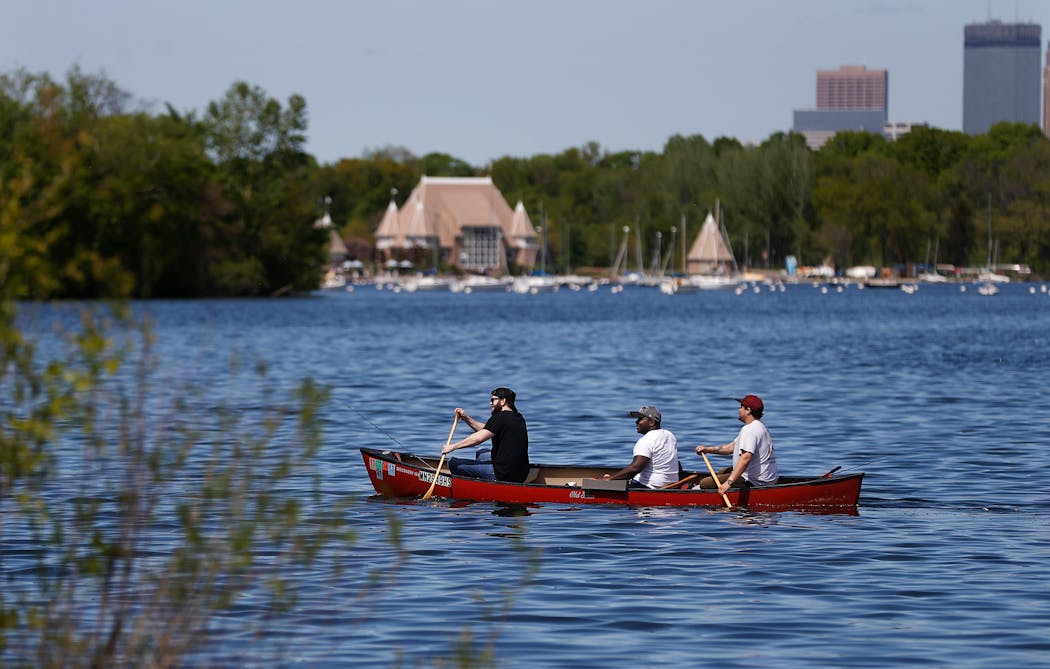What Minnesotans want to know about their Land of 10,000 Lakes
As winter draws to a close, the sun shines a bit brighter and the chilly days turn ever warmer, which can only mean one thing for many Minnesotans: Lake season is almost here.
Minnesota's fabled 10,000 lakes are a favorite topic for readers who submit questions to Curious Minnesota, our community-driven reporting project. Here are answers to some of those queries.
How did Minnesota become known as the 'Land of 10,000 Lakes'?
Despite the famous moniker, Minnesota actually has 14,444 lakes of 10 acres or more, according to the U.S. Geological Survey. While the state's official nickname is the "the North Star State," Minnesota has proudly touted its "10,000 lakes" tagline since 1950, when it first appeared on state license plates.
The earliest references to the phrase, "10,000 lakes" comes from a speech delivered by a professor named Ransom F. Humiston at the Minnesota State Fair on Sept. 11, 1874, said Lauren Peck of the Minnesota Historical Society.
The nickname was broadly adopted by tourism publications starting in the 1920s, she said.
How much of Minnesota's land area is water?
At 51.2 million acres, Minnesota is the nation's 14th-largest state, according to Minnesota House of Representatives researchers. About 2.6 million acres, or roughly 5%, are water.
Don't let Wisconsin or other lake-filled states fool you. Including the Great Lakes, Wisconsin may have a higher percentage of its total area covered by water, but Minnesota has more lakes and overall lake acreage.
What determines the placement of the word "lake" in a Minnesota lake's name?
"There's no hard and fast rule to it, but the generic 'lake' appears in the first position if it's an important, prominent feature, like Lake Superior," said Pete Boulay, climatologist for the Department of Natural Resources.
It's often in the second position for lesser lakes. However, in the end, it's left to the preference of local residents, Boulay said.
Naming a lake requires a petition signed by 15 or more registered voters in a county, who must argue their case before the County Board. Proposed names should avoid confusion with similarly named geographic features and cannot commemorate a living person.
What is the largest fish ever caught in Minnesota waters?
Minnesota is an 86,943-square mile candy store for fishing enthusiasts looking to catch everything from northern pike to flathead catfish. However, the largest catch-and-release length recorded in the state belongs to the torpedo-shaped lake sturgeon.
Last February, an angler from Jordan, Minn., caught a 78-inch sturgeon weighing close to 120 pounds in the St. Croix River, according to the DNR. Standing on its tail fin, that's as tall as the Minnesota Timberwolves' 6-foot-6 guard Jarrett Culvert.
How did Harriet Lovejoy get a lake named after her?
Lovejoy, the wife of a 19th-century commanding officer stationed at Fort Snelling, traveled from the Atlantic Ocean to the Gulf of Mexico and up the Mississippi River to arrive in Minnesota, Boulay said.
While it's not completely clear why Lake Harriet was named after Lovejoy, Boulay said she was probably one of the few women living in Fort Snelling at the time of the lake's naming in the 1820s. As the wife of Col. Henry Leavenworth, she likely would have commanded the respect of the men at the fort.
The lake garnered some attention when Google Earth appeared to show a plane below the Minneapolis lake's surface, although the eerie image turned out to be a simple technical issue.
---
If you'd like to submit a Curious Minnesota question, fill out the form below:
Read more Curious Minnesota stories:
Why do we have water towers and what do they do?
Who are all the people on sidelines during Vikings games?
Why isn't it a crime to punch someone in the face in pro hockey?
Why does the Stone Arch Bridge cross the river at such an odd angle?
How did Minnesota become the Gopher State?
Are roundabouts really safer than traditional intersections?
Why do so many Fortune 500 companies call Minnesota home?



